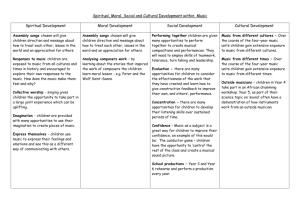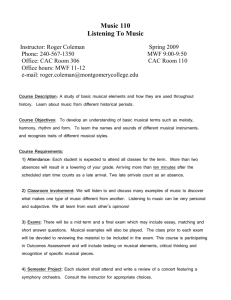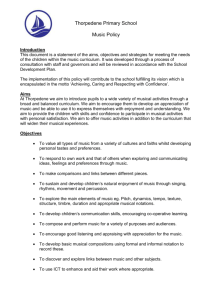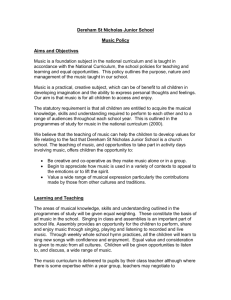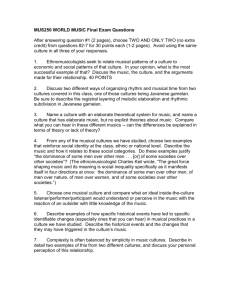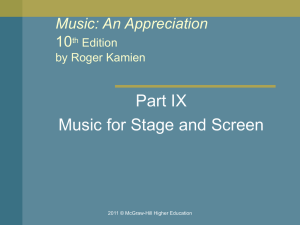music appreciation a (6500)
advertisement
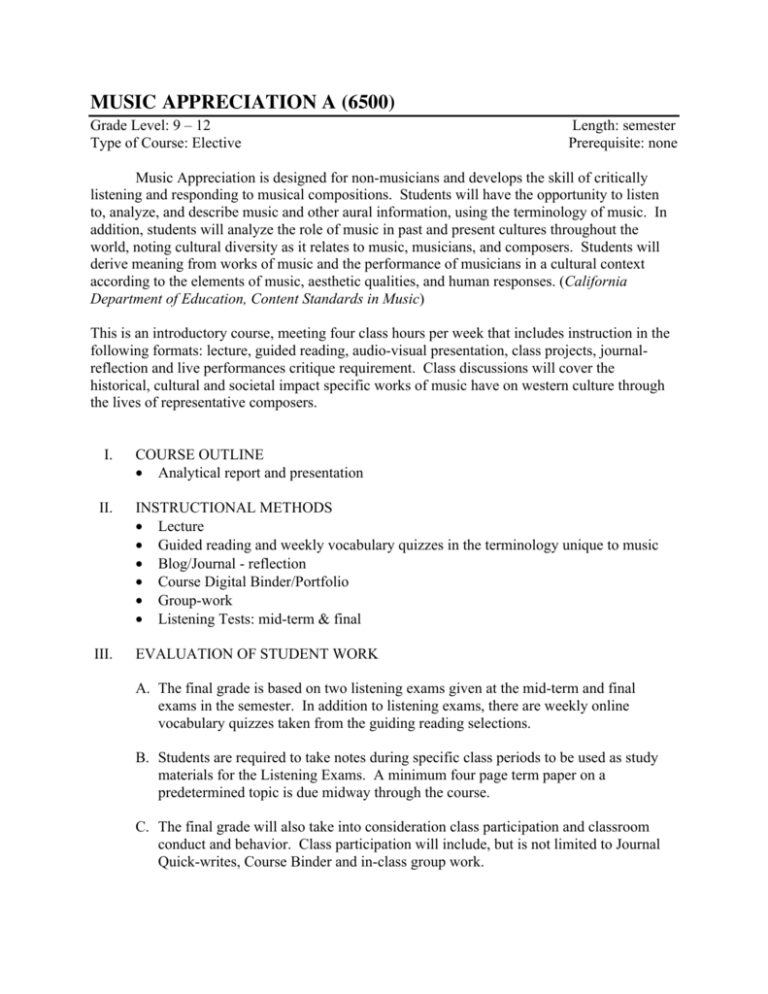
MUSIC APPRECIATION A (6500) Grade Level: 9 – 12 Type of Course: Elective Length: semester Prerequisite: none Music Appreciation is designed for non-musicians and develops the skill of critically listening and responding to musical compositions. Students will have the opportunity to listen to, analyze, and describe music and other aural information, using the terminology of music. In addition, students will analyze the role of music in past and present cultures throughout the world, noting cultural diversity as it relates to music, musicians, and composers. Students will derive meaning from works of music and the performance of musicians in a cultural context according to the elements of music, aesthetic qualities, and human responses. (California Department of Education, Content Standards in Music) This is an introductory course, meeting four class hours per week that includes instruction in the following formats: lecture, guided reading, audio-visual presentation, class projects, journalreflection and live performances critique requirement. Class discussions will cover the historical, cultural and societal impact specific works of music have on western culture through the lives of representative composers. I. II. III. COURSE OUTLINE • Analytical report and presentation INSTRUCTIONAL METHODS • Lecture • Guided reading and weekly vocabulary quizzes in the terminology unique to music • Blog/Journal - reflection • Course Digital Binder/Portfolio • Group-work • Listening Tests: mid-term & final EVALUATION OF STUDENT WORK A. The final grade is based on two listening exams given at the mid-term and final exams in the semester. In addition to listening exams, there are weekly online vocabulary quizzes taken from the guiding reading selections. B. Students are required to take notes during specific class periods to be used as study materials for the Listening Exams. A minimum four page term paper on a predetermined topic is due midway through the course. C. The final grade will also take into consideration class participation and classroom conduct and behavior. Class participation will include, but is not limited to Journal Quick-writes, Course Binder and in-class group work. Course-wide Enduring Understandings 1. Students will listen to, analyze, and describe music and other aural information, using the terminology of music. 2. Students will experience a varied repertoire of music, using digital/electronic technology when appropriate. 3. Students analyze the role of music in past and present cultures throughout the world. 4. Students derive meaning from works of music and the performance of musicians in a cultural context according to the elements of music, aesthetic qualities, and human responses. Course-wide Essential Questions 1. How are the principles and subject matter of music and various disciplines outside the arts are interrelated? 2. How do people in a particular culture use and respond to specific musical works from that culture? 3. How have the roles of musicians and composers changed or remained the same throughout history? 4. What are appropriate terminology and use of musical elements used to describe music? 5. What compositional devices and techniques are used to provide unity, variety, tension and release in musical examples? Unit 1 Music of the West: 1600 – 20th Century • Describe the means used to create images or evoke feelings and emotions in Enduring musical works from various cultures. Understandings • Explain ways in which the principles and subject matter of music and various “Students will disciplines outside the arts are interrelated. understand • Analyze and explain how and why people in a particular culture use and that…” respond to specific musical works from their own culture. • Explore how people in a particular culture use and respond to specific musical Essential works from that culture Questions • Compare and contrast the social function of a variety of music forms in various “Students will cultures and time periods. explore…” • Analyze the role and function of music on Internet, television, and other media. • Analyze and describe the use of musical elements in a given work that makes it unique, interesting, and expressive. Knowledge • Analyze how the roles of musicians and composers have changed or remained Expectations the same throughout history. “Students will • Analyze the stylistic features of a given musical work that define its aesthetic know…” traditions and its historical or cultural context. • Compare and contrast the musical means used to create images or evoke feelings and emotions in works of music from various cultures. • Identify and explain a variety of compositional devices and techniques used to provide unity, variety, tension, and release in aural examples. Skill Expectations • Take effective lecture notes from instructor and/or audio examples of “Students will be representative compositions. able to…” • Analyze and describe the use of musical elements and expressive devices (e.g., articulation, dynamic markings) in aural examples in a varied repertoire of Assessments • • • • • • music representing diverse genres, styles, and cultures. Compare and contrast musical characteristics. Self-reflection Journal Vocabulary Quizzes Listening Exam Individual Term Paper and Presentation Course Portfolio (rubrics) Unit 2: American Musical Theater • Describe the means used to create images or evoke feelings and emotions in Enduring musical works from various cultures. Understandings • Explain ways in which the principles and subject matter of music and various “Students will disciplines outside the arts are interrelated. understand • Analyze and explain how and why people in a particular culture use and that…” respond to specific musical works from their own culture. • Explore how people in a particular culture use and respond to specific musical Essential works from that culture Questions • Compare and contrast the social function of a variety of music forms in various “Students will cultures and time periods. explore…” • Analyze the role and function of music on Internet, television, and other media. • Analyze and describe the use of musical elements in a given work that makes it unique, interesting, and expressive. Knowledge • Analyze how the roles of musicians and composers have changed or remained Expectations the same throughout history. “Students will • Analyze the stylistic features of a given musical work that define its aesthetic know…” traditions and its historical or cultural context. • Compare and contrast the musical means used to create images or evoke feelings and emotions in works of music from various cultures. • Identify and explain a variety of compositional devices and techniques used to provide unity, variety, tension, and release in aural examples. • Take effective lecture notes from instructor and/or audio examples of Skill Expectations representative compositions. “Students will be • Analyze and describe the use of musical elements and expressive devices (e.g., able to…” articulation, dynamic markings) in aural examples in a varied repertoire of music representing diverse genres, styles, and cultures. • Compare and contrast musical characteristics • Self-reflection Journal • Vocabulary Quizzes Assessments • Listening Exam • Group project and presentation • Course Portfolio (rubrics)


